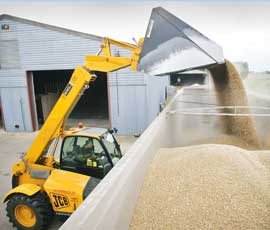Feasibility study looks at new e-passport system

The UK cereals industry is a step closer to joining the digital age this summer with the launch of a feasibility study into a new e-passport system. With the potential to remove millions of pounds of unnecessary costs from the supply chain, farmers across the country could stand to benefit.
The current paper-based Combinable Crops Passport is central to the flow of data between grower, haulier and processor, as well as monitoring post-harvest pesticide treatments. However, its hard-copy nature introduces substantial delays and costs due to data input duplication, as well as unnecessary rejections, claims and haulage.
The idea of a digital system originated from the Cereal Liaison Group, which represents producers, traders and processors across the industry. Funded by the HGCA and backed by the NFU, the feasibility study is looking at the potential benefits and challenges moving to an electronic platform might entail.
“We’re gathering information at this stage,” says coordinator Roz Reynolds. “We started in April and intend to get viewpoints from all parts of the grain chain – from processors to hauliers, merchants and growers.
| Key points |
|---|
| • HGCA feasibility study considering all parts of the supply chain. • Main concerns include software integration, data security and rural broadband/mobile coverage. • Quality and weight data could be linked to the e-passport, providing rapid feedback to farmers. • Farmers could then tailor harvesting and loading priorities to avoid claims and maximise returns. |
“However, this is a very practical study. While the paper system may be outdated, we haven’t a definitive end point in mind. We’re taking an open view, and if the industry determines the current way of doing things works well, we won’t change things for the sake of it.”
The biggest bonus for farmers is likely to be that quality and weight information could be linked to the digital passports. Andy Barr is a grower and director at Weald Granary, Kent, where they have been trialling such a system for the past three years, and he is in no doubt about the potential advantages.
“As a farmer, soon after my load arrives at the store I get an email or text with all the relevant test results. I can also access my data online, password-protected. Meanwhile, the store and the marketing agents have an exact, real-time record of all the grain in store and its quality.”
Having this data so swiftly to hand has allowed Mr Barr to make much better informed harvesting and marketing decisions. “Last year I knew the quality of my grain very quickly, allowing me to choose between harvesting malting barley or milling wheat before the rain came, without spending time delving into records.
“With e-passports, farmers delivering to end users will have very quick feedback about the quality of their grain. They could therefore alter the store it is coming out of or contact their trader if necessary to avoid an unexpected quality claim some time later.”
Developed in association with Precia-Molen and Openfield, as well as Hampshire Grain, Wiltshire Grain and Aberdeen Grain stores, the trial has not been without its glitches.
“Getting different software types to talk to each other is the tricky bit,” says Mr Barr. “Going forward, this will be the key for the wider industry, to make sure it dovetails with all participating systems.”
It is this type of concern that is being addressed by the HGCA’s feasibility study. “The information is going to have to be supplied in a standard format, no matter where in the supply chain it is from, in order for the e-passport to work,” explains Mrs Reynolds.
Other concerns that have been flagged up include patchy broadband and mobile phone coverage in rural areas, as well as data security. And who will pay for digitising the system is also yet to be discussed. “As part of the feasibility study, we’re trying to establish what the cost of the current system is,” she says. “The estimated 1.5m paper grain passports in circulation annually obviously come at a cost, but this is often hidden.”
The study’s findings are due to be presented to the CLG after the 2012 harvest, when they will decide if and when a pilot of the e-passport will take place.

